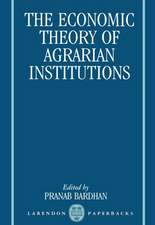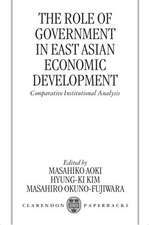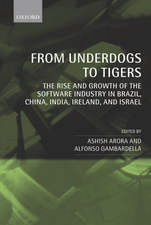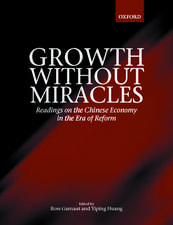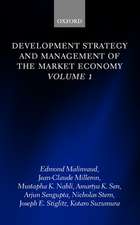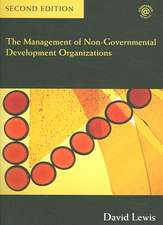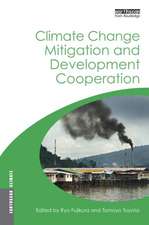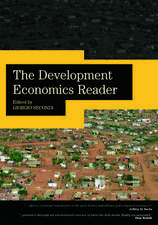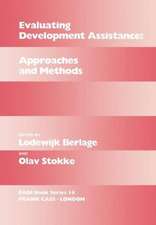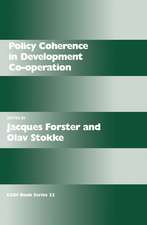Perspectives on European Development Cooperation: Policy and Performance of Individual Donor Countries and the EU: Routledge Research EADI Studies in Development
Editat de Olav Stokke, Paul Hoebinken Limba Engleză Paperback – 13 mar 2009
Perspectives on European Development Cooperation takes stock of such changes, describing and analyzing the new European development agenda, including the role of the European Union. Essays by prominent authorities in the field examine the development policies of individual donor countries and focus on the principles and objectives governing aid strategies and the performances of these policies.
This book will be of interest to students of development studies and those involved in determining development policy.
| Toate formatele și edițiile | Preț | Express |
|---|---|---|
| Paperback (1) | 435.31 lei 6-8 săpt. | |
| Taylor & Francis – 13 mar 2009 | 435.31 lei 6-8 săpt. | |
| Hardback (1) | 1141.09 lei 6-8 săpt. | |
| Taylor & Francis – 23 iun 2005 | 1141.09 lei 6-8 săpt. |
Preț: 435.31 lei
Nou
Puncte Express: 653
Preț estimativ în valută:
83.31€ • 86.65$ • 68.77£
83.31€ • 86.65$ • 68.77£
Carte tipărită la comandă
Livrare economică 12-26 aprilie
Preluare comenzi: 021 569.72.76
Specificații
ISBN-13: 9780415543941
ISBN-10: 0415543940
Pagini: 654
Ilustrații: 95 tables and 10 line drawings
Dimensiuni: 156 x 234 x 34 mm
Greutate: 0.9 kg
Ediția:1
Editura: Taylor & Francis
Colecția Routledge
Seria Routledge Research EADI Studies in Development
Locul publicării:Oxford, United Kingdom
ISBN-10: 0415543940
Pagini: 654
Ilustrații: 95 tables and 10 line drawings
Dimensiuni: 156 x 234 x 34 mm
Greutate: 0.9 kg
Ediția:1
Editura: Taylor & Francis
Colecția Routledge
Seria Routledge Research EADI Studies in Development
Locul publicării:Oxford, United Kingdom
Cuprins
Introduction: European Development Co-operation at the Beginning of a New Millennium 1. The Changing International and Conceptual Environments of Development Co-operation 2. Austrian Aid Policy 3. Belgian Aid Policies in the 1990s 4. British Aid Policy in the ‘Short–Blair’ Years 5. Danish Aid Policy in the Post-Cold War Period: Increasing Resources and Minor Adjustments 6. Finland: Aid and Identity 7. French Development Co-operation Policy 8. Germany’s Development Co-operation Policy since the Early 1990s: Increased Conceptual Ambitions in Times of Severe Financial Constraint 9. The Foreign Aid Policy of Ireland 10. Trends in the Debate on Italian Aid 11. A New Member of the G-0.7: Luxemburg as the Smallest and Largest Donor 12. All in the Name of Quality: Dutch Development Co-operation in the 1990s 13. Norwegian Aid Policy: Continuity and Change in the 1990s and Beyond 14. Spanish Foreign Aid: Flaws of an Emerging Framework 15. Swedish Development Co-operation in Perspective 16. Swiss Development Co-operation: Major Changes since the Early 1990s and Future Challenges 17. The European Union’s Development Policy: Shifting Priorities in a Rapidly Changing World. Glossary. Notes on Contributors. Index.
Notă biografică
Olav Stokke is the Senior Researcher at the Norwegian Institute of International Affairs, where he has also served as Acting Director, Deputy Director and the Research Director. He has written extensively on development issues including Food Aid and Human Security (2000) and Policy Coherence in Development Co-operation (1999).
Paul Hoebink is Associate Professor at the Centre for International Development Issues Nijmegen (CIDIN), the Catholic University of Nijmegen. His research has focused on development co-operation policies, aid effectiveness and evaluation. He has published widely on the aid programmes of the Netherlands, the EU and other donors and is a member of several advisory boards.
Paul Hoebink is Associate Professor at the Centre for International Development Issues Nijmegen (CIDIN), the Catholic University of Nijmegen. His research has focused on development co-operation policies, aid effectiveness and evaluation. He has published widely on the aid programmes of the Netherlands, the EU and other donors and is a member of several advisory boards.
Descriere
Presents an authoritative overview and analysis of the development cooperation policies of individual European donor countries and the European Union with an emphasis on continuity and change in the 1990s and beyond.










